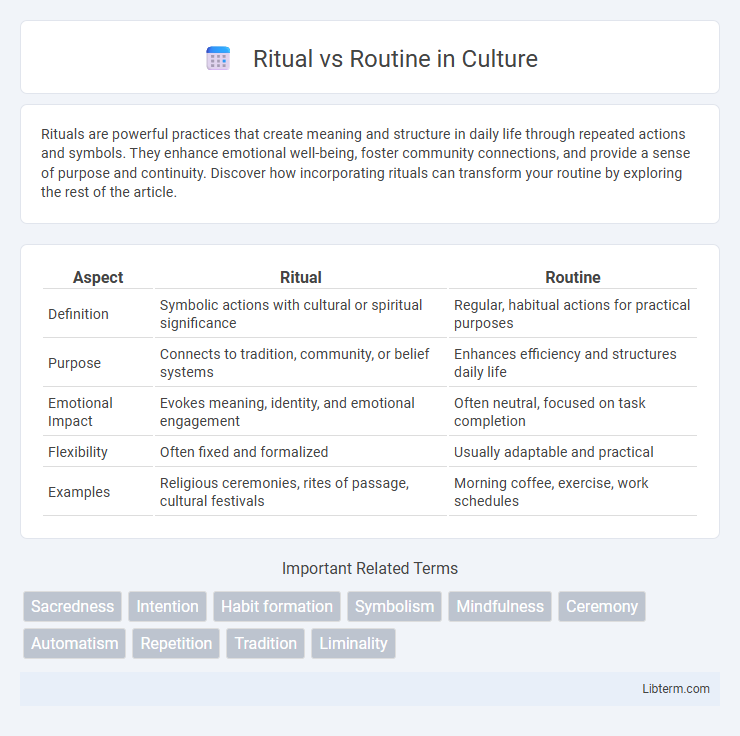Rituals are powerful practices that create meaning and structure in daily life through repeated actions and symbols. They enhance emotional well-being, foster community connections, and provide a sense of purpose and continuity. Discover how incorporating rituals can transform your routine by exploring the rest of the article.
Table of Comparison
| Aspect | Ritual | Routine |
|---|---|---|
| Definition | Symbolic actions with cultural or spiritual significance | Regular, habitual actions for practical purposes |
| Purpose | Connects to tradition, community, or belief systems | Enhances efficiency and structures daily life |
| Emotional Impact | Evokes meaning, identity, and emotional engagement | Often neutral, focused on task completion |
| Flexibility | Often fixed and formalized | Usually adaptable and practical |
| Examples | Religious ceremonies, rites of passage, cultural festivals | Morning coffee, exercise, work schedules |
Understanding Rituals and Routines: Key Differences
Rituals are intentional, meaningful actions often linked to cultural or personal significance, designed to create emotional connection and mindfulness, whereas routines are habitual, practical behaviors performed regularly to manage daily tasks efficiently. Rituals emphasize purpose, symbolism, and emotional impact, contrasting with routines that prioritize consistency and functionality. Understanding these distinctions enhances personal growth by integrating mindful rituals into otherwise automatic routines for a balanced lifestyle.
The Psychology Behind Rituals and Routines
Rituals engage the brain's dopamine system by creating a sense of meaning and predictability, enhancing emotional regulation and reducing stress. Routines, anchored in habit formation within the basal ganglia, optimize efficiency and free cognitive resources for complex tasks. Both rituals and routines contribute to psychological well-being, but rituals uniquely activate symbolic thinking and oxytocin release, fostering social bonding and mental resilience.
How Rituals Shape Our Daily Lives
Rituals shape our daily lives by infusing actions with meaning and intentionality, transforming ordinary routines into purposeful experiences that enhance emotional well-being and social connection. Unlike routines that are often repetitive and automatic, rituals engage mindfulness and symbolism, reinforcing identity and values through consistent practice. Neuroscientific studies reveal that rituals activate brain regions associated with reward and stress reduction, highlighting their role in promoting mental health and resilience.
The Science of Routines: Building Productive Habits
The science of routines emphasizes that consistent, automatic behaviors strengthen neural pathways, making habits more efficient and productive over time. Rituals, distinguished by symbolic meaning and mindfulness, engage emotional and cognitive centers, enhancing motivation and long-term adherence. Building productive habits involves leveraging cue-routine-reward loops, which reinforce behavior through repetition and positive feedback in the brain's basal ganglia.
Emotional Impact: Rituals vs. Routines
Rituals evoke deeper emotional connections by incorporating symbolic actions that enhance meaning and significance, often leading to greater feelings of belonging and well-being. Routines, while promoting efficiency and consistency, typically lack the emotional resonance that transforms behaviors into memorable and impactful experiences. Engaging in rituals can elevate mood and reduce stress through intentional, purposeful actions that routines often miss.
Rituals in Cultural and Spiritual Practices
Rituals in cultural and spiritual practices often serve as meaningful ceremonies that reinforce community bonds and transmit values across generations. These symbolic actions, such as traditional dances, prayer recitations, or rites of passage, create a shared sense of identity and continuity, deeply embedding spiritual beliefs into daily life. Unlike routines, rituals carry intentional significance and are imbued with emotional resonance, enhancing mindfulness and connection within the culture.
The Role of Routines in Achieving Goals
Routines establish consistent daily behaviors that create a structured path toward achieving specific goals by minimizing decision fatigue and enhancing productivity. The predictable nature of routines fosters habit formation, embedding goal-oriented actions into automatic processes that drive sustained progress. By aligning routines with clear objectives, individuals can optimize their time management and maintain focus, ultimately increasing the likelihood of goal attainment.
Transforming Routines into Meaningful Rituals
Transforming routines into meaningful rituals enhances daily experiences by embedding intention and mindfulness into repetitive actions. Rituals engage emotional and psychological layers, fostering a deep sense of purpose and connection beyond mere habit formation. Incorporating sensory elements and symbolic gestures elevates routines into transformative practices that promote well-being and personal growth.
Rituals vs. Routines in Modern Workspaces
Rituals in modern workspaces foster a sense of community and shared purpose by integrating meaningful practices such as daily stand-ups or gratitude sessions, which boost employee engagement and well-being. Routines, while essential for productivity, tend to focus on repetitive tasks and time management without the emotional or cultural connection that rituals provide. Incorporating rituals into workplace culture enhances collaboration, reduces stress, and promotes a positive organizational atmosphere beyond the efficiency-driven impact of routines.
Choosing What Works: Integrating Rituals and Routines
Choosing what works involves blending rituals and routines to enhance daily productivity and well-being. Rituals provide meaningful, intentional practices that foster mindfulness and emotional connection, while routines offer structured, efficient repetition for consistency. Integrating both allows individuals to create a balanced framework that supports habit formation and purposeful living.
Ritual Infographic

 libterm.com
libterm.com